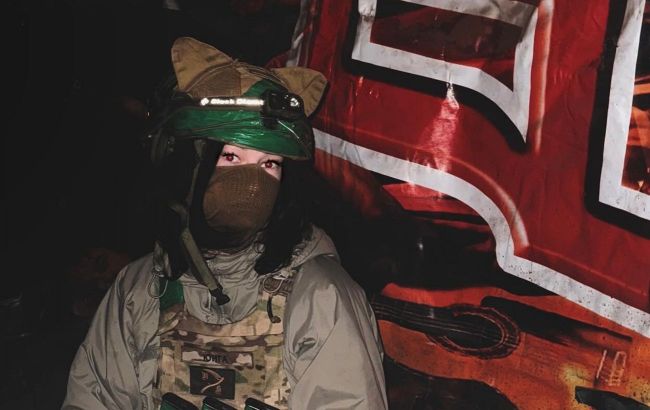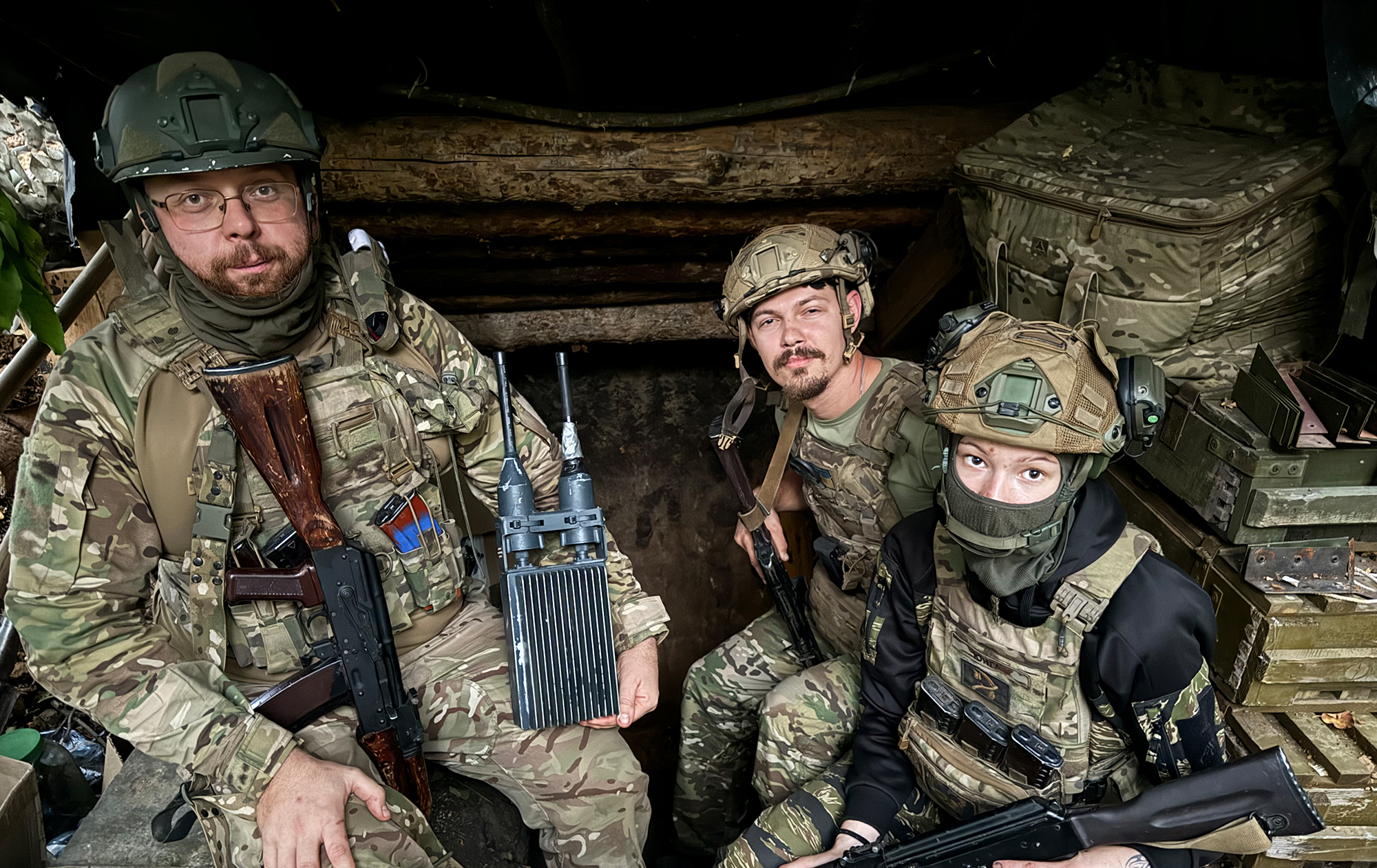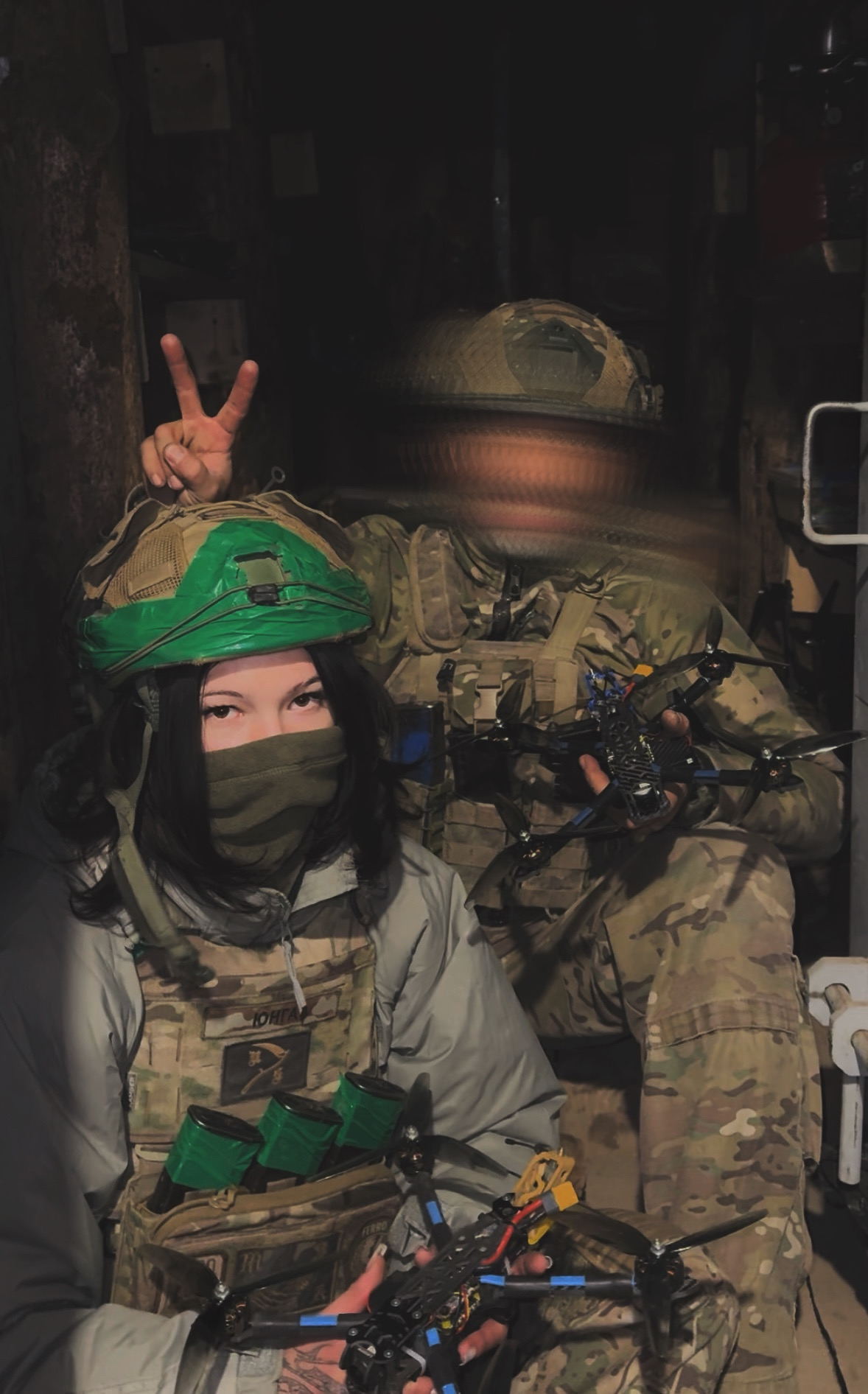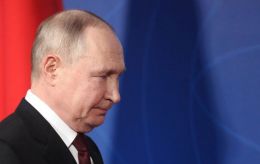'I'll stay at war until end': Story of 19-year-old Ukrainian woman drone operator
 19-year-old drone operator Yeva "Yunha" (all photos: provided by the interviewee)
19-year-old drone operator Yeva "Yunha" (all photos: provided by the interviewee)
Yevа, call sign "Yunha," joined the military at the age of 18. As part of the Rubizh Brigade of the National Guard of Ukraine, Yevа eliminates the enemy with FPV drones. In an interview with RBC-Ukraine, the girl speaks about her first year on the front line, the challenges during combat missions, the greatest threat from the enemy, and her biggest dream.
How Yevа joined Ukrainian army
We meet FPV drone operator Yeva "Yunha" in Kyiv. Here, she is undergoing rehabilitation after an injury she sustained in the Donetsk region.
"We were driving to our positions when a Russian drone hit our vehicle. It was a direct hit. But fortunately, no one was seriously hurt; we just got concussions. I consider it some kind of luck that the shrapnel went into the ground and not into us," Yeva recalls.
She's only 19, but for a year and a half now, she's been eliminating the enemy as part of the Rubizh Brigade of the National Guard of Ukraine.
"As soon as I turned 18, I joined the military. It was a conscious decision. I knew exactly where I was going and specifically wanted to join a combat brigade," the girl says.
Yeva faced the full-scale invasion while still a schoolgirl. Although there was no sense of war in her native Uzhhorod at the time, the girl quickly realized she wouldn't be able to stand aside from events in the country.
So, after completing her first year of university, as soon as she turned 18, she signed a contract.
"At first, people treated me like a kid - and honestly, I think I really was a kid back then. Plus, they didn't want to take me into the brigade because it was like, 'an 18-year-old girl who looks 16, a first-year university student, and she comes in saying she wants to go to war,'" Yeva recalls.
 The girl faced the full-scale war as a schoolgirl and signed a contract as soon as she turned 18
The girl faced the full-scale war as a schoolgirl and signed a contract as soon as she turned 18
Training and first missions
Basic training lasted about a month. Then - straight into the combat zone. The first direction she had to work in was the Bakhmut axis.
"In fact, real training only begins in the combat zone. It's a completely different dynamic - you learn to make decisions on the fly," says Yeva. "Everything can depend on a single moment, a single second. It's no longer a training range. It's a place where anything can happen, at any moment, and you have to be ready for that."
'I love hunting infantry the most'
Among the key qualities of an FPV operator, "Yunha" names focus, attentiveness, calmness, and the ability to control emotions even in stressful situations.
"This isn't a computer game. You need to have a real understanding of your target, the terrain, and the timing. And there has to be a desire to improve. Technology moves forward fast, and you need to keep upgrading your skills," she notes.
Among her favorite tasks, Yeva names hunting down isolated enemy targets.
"I understand that taking out equipment, artillery, and other large, massive targets is definitely more strategically valuable, but when you're terrorizing and eliminating infantry, it honestly brings more satisfaction," the female drone operator adds.
But destroying equipment also brings satisfaction.
"I remember hunting a buggy once, and it was extra fun because it was moving pretty fast. Moments like those really stick with you because it’s just so interesting to take out equipment, especially when you see it beautifully burning afterward," Yeva shares.
Each mission is carried out by a crew. Thanks to well-coordinated teamwork, they can do over 20 launches a day. The girl says it's most effective to work in tandem with reconnaissance drones. They provide more accurate target coordinates and live-stream what's happening around them.
"It's easier to hit a target when you’re working in a pair. Because the FPV drone's camera isn't that great, and you won't always find what you need with it alone. Plus, of course, it's way better when you have more accurate data and someone helping you out," she says.
 As part of the Rubizh Brigade of the National Guard of Ukraine, "Yunha" destroys the enemy with FPV drones
As part of the Rubizh Brigade of the National Guard of Ukraine, "Yunha" destroys the enemy with FPV drones
Greatest threat from enemy
Russian fiber-optic drones are a serious problem. They're more stable and can operate without delays. This adds extra tension, Yeva says, because you have to react faster and make split-second decisions.
Her brigade also uses fiber-optic drones, and their effectiveness is very high.
"But we don't have nearly as many of them. And the downside is that when you're working with a large number of these, you leave the fiber-optic line hanging on trees or other spots, and that gives away your position, your launch site. And the enemy can see where you're launching from," Yeva says.
Rest on front line
When the girl is in the position, she always has to be ready: you're either working, waiting, or immediately launching on a target.
"Sure, you can sleep. And when there's a chance, when the weather’s terrible and there's no target you can immediately strike. But it can happen that you lie down, fall asleep for 10 minutes, and then you already have to launch on a target," the Ukrainian drone operator Yeva says about the specifics of her job.
'My parents understood me'
The girl joined the National Guard of Ukraine at 18. Even though there had never been a military person in her family. So her decision somewhat surprised her parents. Still, no one tried to talk her out of her conscious choice.
"My parents weren't thrilled. I get it - they worry a lot about me because I’m really in danger. But morally, they completely understand what I'm doing, why I'm doing it, and they support me however they can. On my end, I try not to tell them about the really dangerous moments so they don't worry even more," "Yunha" says.
The girl is currently undergoing rehabilitation in Kyiv after being wounded in the Donetsk region.
Talisman for protection
The girl always carries a talisman - a pendant with the symbolic engraving: "100% hits."
Yeva never takes it off. It was a gift from a very important person in her life - her boyfriend. He's also a soldier but serves in a different unit. So, unfortunately, they rarely get to see each other.
"I've decided for myself that I'll stay in the army until the very end. And after the victory, I'll stay in the military. Right now, my dream is for victory, and to see my family, my relatives, and the people close to me a little more often than I can now," Yeva concludes.

